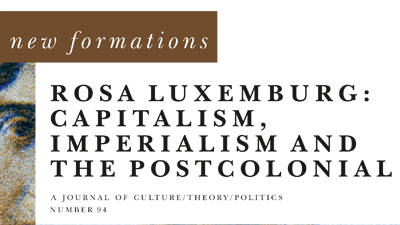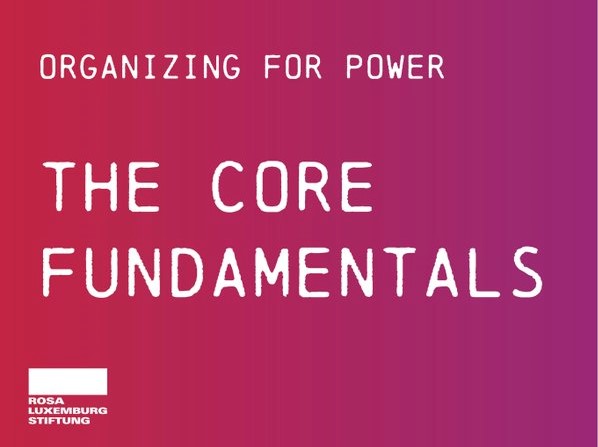Share Twitter Facebook Email Copy URL
An interview with Evelin Wittich situating Rosa Luxemburg as a European and global thinker

Evelin Wittich helped to establish the Rosa-Luxemburg-Stiftung in the early 1990s and worked for years as its executive director and later as the director of political education. She has studied the life and work of Rosa Luxemburg for decades. This interview originally appeared in New Formations 94: Rosa Luxemburg: Capitalism, Imperialism and the Post-Colonial.
Critical responses to questions put by Filippo Menozzi
What are the implications of considering Rosa Luxemburg as a European thinker, given the left’s strong critique of the EU as a neoliberal, unequal, and colonising institution?
Although she lived and fought over one hundred years ago, Rosa Luxemburg is, from today’s perspective, a modern, inspiring European thinker. She thought of Europe as a whole, with a common history and common interests among the working classes and the oppressed. In her work, The National Question and Autonomy, she develops a positive concept of nationality based on a detailed analysis of the national composition of Lithuania and the Caucasus region. Her point of departure is the statement that capitalism alters social life ‘from its material foundations up to the top, to its cultural manifestations’.[1] She concludes, “Capitalism, however, does not create this intellectual culture in the air or in the theoretical void of abstraction, but in a particular territory, a particular social environment, a particular language, within the framework of particular traditions, in a word, within particular national forms” (ibid, p. 159). In this way it shapes a particular population into a cultural and national totality in a particular territory. The result of this is national culture, which shares common characteristics in all bourgeois countries. Luxemburg sees this as a tendency toward the development of an international cultural community, something that she also views as the goal of a socialist politics. But in order to arrive at that point, Luxemburg develops a concept of autonomy over the land and self-government that is only possible ‘where the nationality in question possesses its own bourgeois development, urban life, intelligentsia, its own literary and scholarly life’ (ibid, p. 168). This autonomy is, just like the bourgeois state, bound up with its own territory. How is this territory determined, however? Rosa Luxemburg investigates the question of Lithuanian autonomy and, using the census of 1897, captures the various nationalities of the country in meticulous detail. She notes that the proportion of Lithuanians in the total population is only 23 per cent, and that these Lithuanians, furthermore, live in different areas, and she concludes that “every Lithuanian project of national autonomy is utopian and therefore irrelevant, in view of the numerical and social relations of the nationalities involved” (ibid, p. 178). Her examination of the Caucasus region leads to a similar result – after many pages of analysis. Luxemburg sees the solution to the national question in “democratically securing the freedom of cultural existence to all nationalities, without any among them dominating the remaining ones, and at the same time meeting their concrete needs for modern development … without defining this according to ethnographic boundaries, but through a practice of broad local self-government … without giving privileges to any one nationality” (ibid). To take one example, the question of which languages will be spoken or what the school system will look like, etc., must be decided democratically. Luxemburg sees the equality of nationalities as a condition for their coexistence, rather than their isolation within the boundaries of national autonomy (cf. p. 179). She clearly advocates territorial autonomy and rejects national autonomy.
An intensive study of Luxemburg’s approaches to the question of how nationalities interact is, in my view, extremely stimulating in the search for socialist solutions in the European Union.
Luxemburg would certainly agree with the left’s critique of the state of the European Union today. And left-wing movements in contemporary Europe could also certainly concur with her critique when it comes to the political left’s few tentative solutions for Europe, for a culturally interconnected Europe with social justice and solidarity. But these are just thought games. Today’s problems must be solved by today’s left. Rosa Luxemburg, however, offers foundational ideas for these solutions.
What is Rosa Luxemburg’s position in the canon of twentieth-century Marxists?
After her death in 1919, Luxemburg’s views were suppressed in the course of the Bolshevization of Communist parties, declared false, even harmful, most notably when Stalin branded her views as “Luxemburgism”, a stamp used to charge defendants in the Soviet purges of 1939.
It was only after the second half of the twentieth century that Luxemburg’s works were brought back into academic and political discussion, for exampleby scholars from the International Rosa Luxemburg Society (IRLG) under Professor Narihiko Ito. The fight to publish her collected works in the GDR on the one hundredth anniversary of her birth, which was prepared under the leadership of Günter Radczun and Annelies Laschitza in an edition of five volumes, contributed to a reassessment of Luxemburg as a Marxist thinker. The discussion of her significance has grown more intense in the last thirty years. Numerous artistic works have also added to this, as did the film Rosa Luxemburg by Margarethe von Trotta.
Which of Rosa Luxemburg’s views are relevant to our current discussions?
The Rosa Luxemburg Foundation (RLS) has organised conferences on Luxemburg in Moscow, Johannesburg, Guangzhou, Wuhan, at the World Social Forum in Porto Alegre, Berlin, Erfurt, Buenos Aires, New York, London and other cities in cooperation with the IRLG, but also in cooperation with regional foundations and foreign offices. The discussions that take place at these conferences go to the heart of the problems of development on the socialist left today.
Luxemburg never found herself in the position of discussing her ideas in the context of a concrete stake in government. Today it’s different. Left-wing, socialist parties have increasingly come into the position of taking government responsibility. At our conferences and seminars there has been, to some extent, fierce criticism of the way in which left-wing government responsibility is actually administered.
It is surprising how many aspects of Luxemburg’s thought are still of interest today: her understanding of politics, her views on democracy, her understanding of revolution, her relationship to feminist beliefs, her understanding of parties and the role of broad political actors – the masses – but also her work on economics, her views on nationality and nationalism as well as her relationship to militarism and war.
Is Luxemburg’s internationalism still meaningful today? How can political activists relate to Luxemburg’s positions in social struggles in Europe today? What is your opinion of Luxemburg’s understanding of autonomy and national independence in the time of Brexit and populist national movements in Europe?
Rosa Luxemburg’s internationalism is of the utmost relevance in a time of populist nationalist movements, some of which advocate extreme right-wing positions using offensive, sometimes inhuman rhetoric. For her, the question of nationality took a back seat to the struggle for social justice, but it did play a role when it came to the exploitation and suppression of nationalities. She had no sympathy for nationalism and the struggle of a social-democratic party for a nation-state as a primary political goal. This is why she wrote, in The Question of Nationality and Autonomy, that:
The question of nationality cannot be allowed to form an exception to all other political, social and moral questions examined through modern socialism, and it is unacceptable to distinguish it from them with some general template, even if it is such a pretty-sounding formulation as ‘the right to self-determination of all nations’. For this formulation either means nothing at all, and is an empty phrase that entails no obligations on our part, or it asserts the unconditional duty of socialists to support all national endeavours, in which case it is quite simply false (pp. 52-53).
In her doctoral thesis on the industrialisation of Poland, Luxemburg also analysed the intertwining of Polish and Russian industry, and the common interests of the Polish and Russian proletariats that inevitably resulted from this. In the revolution of 1905-6, these common interests also led them into a common struggle. It was then, inspired by this, that she uttered her famous dictum: The revolution is magnificent, everything else is bilge!
In The Question of Nationality and Autonomy (written 1908-9), she analysed Europe as it was, and argued that a Polish nation-state was simply not realistic. Of course, Luxemburg could not have foreseen how the result of World War I would change this situation. In general, the German Social Democrats’ support for war loans in 1914 was a shock to her and a betrayal of the international solidarity of the working class.
However, for the Kingdom of Poland – that is, the part of the “Polish Congress” which belonged to the Russian Empire – Luxemburg saw all the conditions for autonomy fulfilled. She supported the struggle of the Polish proletariat for legislation for autonomy, and she consistently advocated for the removal of tariff and trade restrictions between various parts of a state territory. She also, certainly, reflected on the fact that these policies could serve the modern development of capitalism as well. Nonetheless, they offered the chance to provide better conditions for the international proletariat acting in a spirit of solidarity.
These views of hers could nevertheless serve as an inspiration to left-wing movements in Europe in the development of conceptions of autonomy in which a common international solidarity is possible. The point is to look positively at the question of nationality in Luxemburg’s sense of the term, to look in a way that will be encouraging for the common international struggle and opposition to the forces of national-egotism.
Is there a difference between Luxemburg as a continental, European intellectual and as a global thinker who is interested in pre-capitalist and non-capitalist societies outside of Europe?
Luxemburg, as a European intellectual and as a global thinker, did not have a divided personality. She analysed brutal colonial exploitation just as she analysed capitalist exploitation in European countries:
Capitalist production, as genuine mass production, is dependent on buyers from peasant and handicraft spheres of production in the old countries as well as on consumers from all other countries, and at the same time, in technical terms, it absolutely cannot get along without the products of those other countries and social strata (no matter whether the products be means of subsistence or means of production). Thus, from the very beginning, an exchange relationship necessarily had to develop between capitalist production and its non-capitalist milieu, and in this relationship capital found it possible to realize its own surplus value in shiny pieces of gold for the purpose of further capitalization as well as to provide itself with all sorts of commodities necessary for the expansion of its own production, and in addition, to obtain ever-new recruits to the proletarianized workforce.[2]
The cycle of capital would have faltered if it had failed to seize the non-capitalist ‘Third World’ as a source of cheap raw materials and as a market for expensive industrial products from the capitalist “motherlands” – but through this they ended up at one another’s throats: competition for these colonies would ultimately drive the capitalist “motherlands” into a world war.
In the paragraph just quoted she also analysed the Moroccan affair of 1911 as a complex conflict of interests among the European colonial powers of France, England, Spain, Germany and others, seeing in them the possible repercussions of war and economic decline for all sides: for the European population as well as for the people in the colonies.
Luxemburg was very interested in pre-capitalist societies. In her economic lectures and writings she examined, for example, slave-holding societies or the society of the Incas in search of interesting approaches that would be useful for a socialist society. This is particularly interesting today, because there is, in my opinion, not enough interest in experimental solutions to social problems from past societies and their possible relevance for alternatives in our own time.
How relevant is Luxemburg’s interest in plants and animals, her botanical studies, for engagement with her today? What is the relationship between these interests and her political and philosophical views?
Luxemburg’s intimate relationship with plants and animals was significant for her personally as well as for her sense of justice, democracy and all her political engagement. Her perspective on nature and human society had the same origin: a deep humanism that she also extended to nature’s creations. She maintained the same standards for dealing with nature as she did for human society. This remains an essential and fascinating aspect of her personality.
At the age of seventeen, Luxemburg went to Zurich to study science, something possible for women only in Switzerland. It was thanks to Leo Jogiches, a Russian emigrant in Zurich and her long-time lover, that she shifted to politics and political science. Her love for the sciences, however, endured.
Are Das Herbarium (the recent German publication of Luxemburg’s botanical notebooks) and Kate Even’s comic book Red Rosa comparable projects?
Luxemburg’s Herbarium, published by Karl Dietz Verlag Berlin, has a peculiar history. The historians who were working on Luxemburg knew from her letters that she had worked on this herbarium in several notebooks. But whether it still existed and, if so, where, was unknown. Holger Politt, the office manager of the Rosa Luxemburg Foundation in Warsaw, found it after an intensive search in the Archiwum Akt Nowych. It is an impressive work, which is important for understanding her personality. This is why it was published.
Kate Evan’s wonderful graphic novel Red Rosa is an empathetic introduction to Rosa Luxemburg for a young audience today. In contemporary engagement with Luxemburg’s work, the impression made by her personality plays an extraordinarily important role in bringing people closer to her political views.
[1] Rosa Luxemburg, Nationalitätenfrage und Autonomie [“The Question of Nationality and Autonomy”], ed. and trans. by Holger Pollit, Berlin: Karl Dietz Verlag 2012, p. 158.
[2] Rosa Luxemburg, The Complete Works of Rosa Luxemburg, Vol. 2, edited by Peter Hudis and Paul Le Blanc, Verso: London and New York, 2015, p. 360.



